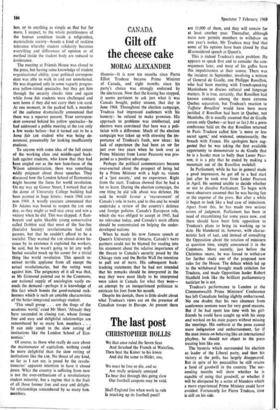Gilt off the cheese cake
CANADA MORAG ALEXANDER
Ontario—It is now ten months since Pierre Elliot Trudeau became Prime Minister
of Canada, and eight months since his party's choice was strongly endorsed by the electorate. Now that the kissing has stopped, it seems pertinent to ask just what it was Canada bought, policy unseen, that day in June 1968. Throughout the election campaign, Trudeau had impressed audiences with his June 1968. Throughout the election campaign, Trudeau had impressed audiences with his honesty : he refused to make promises. His approach to problems was intellectual, and electors were convinced that here was a poli- tician with a difference. Much of the election campaign was taken up with stressing the im- portance of Trudeau's fresh,_ new ideas: his
lack of experience (he had been an isn, for just over two years when he took over as Prime Minister from Lester Pearson) was pro- jected as a positive advantage.
Perhaps the political commentators became over-excited about the prospect of being led
by a Prime Minister with a high IQ, visions
of a 'just society,' and no experience. Right from the start, Trudeau showed that he had a lot to learn. During the election campaign, the one thing he did talk about was defence. He said he would favour a 'reassessment' of
Canada's role in NATO, and to this end he would
undertake a review of the country's defence and foreign policies. Canada's European role, which she was obliged to accept in 1945, had no relevance today, and Canada's main efforts should be concentrated on helping the under- developed nations.
When he made his now famous speech at Queen's University in Ontario, Canada's NATO partners could not be blamed for reading into his statement about the relative importance of the threats to Canada's security posed by the Chicago riots and the Berlin Wall the intention to pull out of NATO. His subsequent back- tracking statements that he had not intended that his remarks should be interpreted in the way they were most likely to be interpreted were taken in Canada for what they were— an attempt by an inexperienced politician to extricate his foot from his mouth.
Despite his denials, there is little doubt about what Trudeau's views are on the presence of Canadian troops in Europe. At present there
are 11,000 of them, and they will remain for at least another year. Thereafter, although NATO now permits members to withdraw on one year's notice, Mr Trudeau may find that some of his options have been closed by that ill-considered speech at Queen's.
This is indeed Trudeau's main problem. He appears to speak first and to consider the con- sequences later, and most of his gaffes have this impulsiveness at their source. There was the incident in September, involving a minion of General de Gaulle, one Philippe Rossillon, who had been meeting with French-speaking Manitobans to discuss cultural and language matters. It is true, certainly, that Rossillon had known contacts among the more extreme Quebec separatists, but Trudeau's reaction to Tafiaire Rossillon' would have been more justified if Rossillon had been in Quebec, not Manitoba. (It is usually assumed that de Gaulle covets only Quebec—at least so far.) At a press conference held on the day Rossillon returned to Paris Trudeau called him 'a more or less secret agent,' and widened, unnecessarily, the breach with France. His apologists have sug- gested that he was taking the first available opportunity to demonstrate to de Gaulle that be is a harder man to bully than Lester Pear- son; it is a pity that he ended by making a mountain out of the Rossillon molehill.
In Parliament, while he has in general made a good impression, he got off to a bad start just after he took over from Lester Pearson in April. He seemed unable to decide whether or not to dissolve Parliament. To begin with most observers assumed that he was having fun at the expense of the press. But after a while it began to look like a bad case of indecision. Apart from this, he has made two serious errors of judgment. Parliament has been in need of streamlining for some years now, and there should have been little opposition to Trudeau's plans to bring its working up to date. He blundered in, however, with charac- teristic lack of tact, and instead of consulting the Opposition about the rotation of ministers at question time, simply announced it in the Commons. More recently, just before the Christmas recess, he was forced to withdraw for further study one of the proposed new rules for the House. The debate which led up to the withdrawal brought much criticism for Trudeau, and made Opposition leader Robert Stanfield look like the brilliant parliamentary tactician he is not.
Trudeau's performance in London at the Commonwealth Prime Ministers' Conference has left Canadians feeling slightly embarrassed. No one doubts that his two absences from conference sessions were for very good reasons. But if he had spent less time with his girl- friends he could have caught up with his sleep and worked on his state papers without missing the meetings. His outburst at the press caused more indignation and embarrassment, for if the man insists on behaving like an international playboy, he should not object to the press treating him like one.
The hysteria which surrounded his election as leader of the Liberal party, and then his victory at the polls, has largely disappeared. But in spite of his peccadillos he still retains a fund of goodwill in the country. The suc- ceeding months will show whether he is capable of using that goodwill, or whether it will be dissipated by a series of blunders which a more experienced Prime Minister could have avoided. Fortunately for Pierre Trudeau, time is still on his side.






































 Previous page
Previous page